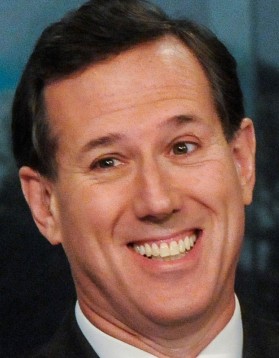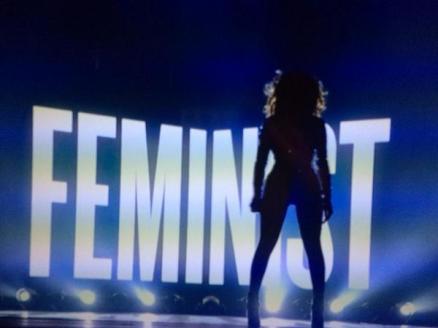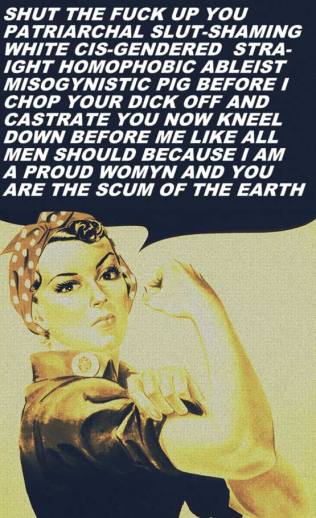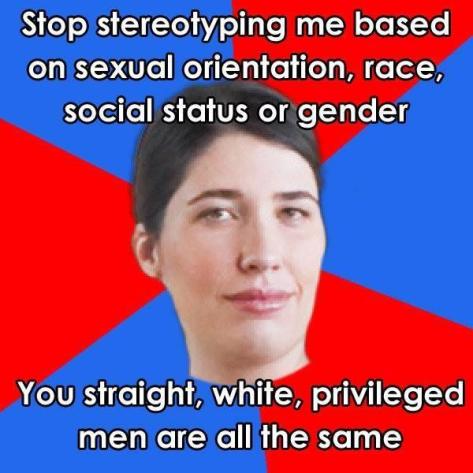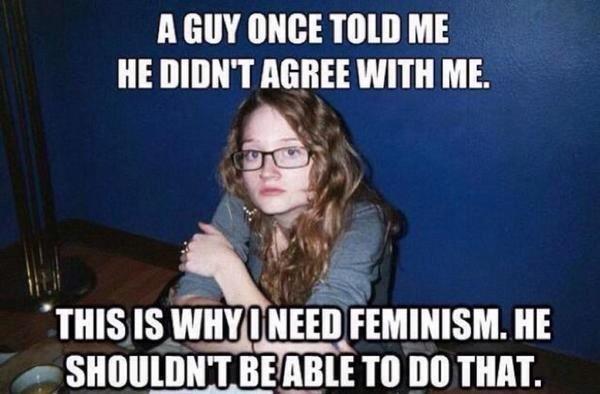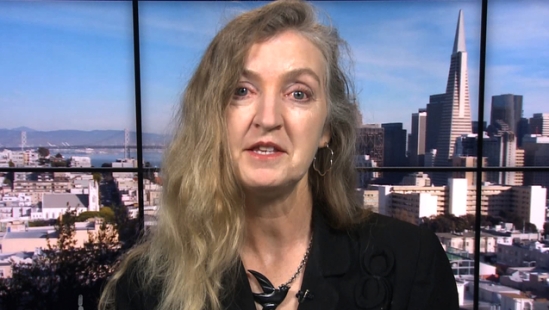
Every now and then, someone writes something so utterly wrongheaded that merely providing a link to it and discussing what’s so offbase about it in general terms isn’t sufficient. When the errors contained in a piece of writing are egregious enough, the only remedy is to take it virtually line by line, and refute every brain-addled argument individually. That’s exactly what I intend to do from now on when I encounter an especially ignorant piece, provided it was written anytime within the last year or so. Today’s offender is an interview of feminist writer Rebecca Solnit from earlier this year, conducted in truly sycophantic fashion by fellow feminist Jessica Valenti, entitled “Mansplaining, explained.”

The first red flag that no attempt will be made to be fair towards men or allow any complexity into the interview is right there in the headline, and is typical of feminist hypocrites like Valenti. When a man says anything to or about women, it’s “mansplaining,” but when women discuss men it’s simply “explaining.” The gender of any speaker only needs to be wielded as a means of discrediting them if they happen to be a man. When feminist women are speaking, everyone else is supposed to take it as a given that their views are unimpeachable and their explanations entirely accurate. A more appropriate headline would have been “Mansplaining, femsplained” since the entire interview is basically nothing but Solnit and Valenti gleefully reveling in their debunked, stereotypical views of men, and talking about us in such condescending fashion that it’s impossible to think either one has ever listened to anything said by a man (who doesn’t spit out feminist talking points like Pez) without dismissing it based solely on his gender. That lopsided headline presents an inauspicious start to the interview, and it barrels downhill at full speed from there. Both the softball questions posed by Valenti and the answers given by Solnit are rife with bigoted idiocy. I’ll handle each of their bimbo exchanges one at a time.
VALENTI: How do you feel about being considered the creator of the concept of “mansplaining”? Your now-famous essay – which really gave women language to talk about the condescending interactions they’ve had with men – certainly gave birth to the term, but you write in the book that you didn’t actually make up the word.
Problems with the question: Women did have plenty of language they could use to express displeasure with men who talk down to them. What’s wrong with just using the word “condescending?” Since Valenti used that word in the question itself, and condescends to men all the time, I’m assuming she’s familiar with what it means. You don’t need to create gender specific terms for a condescending person unless you think it’s only wrong for certain types of people to condescend. What Valenti really means is not that women need even more words to choose from to describe what it’s like to be talked down to. She’s saying that feminists need more words that are explicitly demeaning to and dismissive of men. She doesn’t say why feminism harbors such resentment for men that it can’t accept even the possibility that some of us know a thing or two some women don’t. But we’ll just skip that and move on to Solnit’s reply.
SOLNIT: I used to be ambivalent, worrying primarily about typecasting men with the term. (I have spent most of my life tiptoeing around the delicate sensibilities of men, though of course the book Men Explain Things to Me is what happens when I set that exhausting, doomed project aside.) Then in March a PhD candidate said to me, No, you need to look at how much we needed this word, how this word let us describe an experience every woman has but we didn’t have language for.
And that’s something I’m really interested in: naming experience and how what has no name cannot be acknowledged or shared. Words are power. So if this word allowed us to talk about something that goes on all the time, then I’m really glad it exists and slightly amazed that not only have I contributed about a million published words to the conversation but maybe, indirectly, one new word.
Problems with the reply: It’s hard to miss the admission right off the bat that she no longer cares if men are typecast. She also dismissively states that men have “delicate sensibilitites,” as though any man who objects to her misandrous attitude is simply brittle and over-emotional. That’s pretty ironic, since the term “mansplaining” is so often used by manipulative feminists with hairtrigger tempers. Solnit then echoes Valenti nearly word for word in reiterating the ridiculous notion that bigoted feminist jargon is serving a “needed” purpose, turning the interview into an opportunity for she and Valenti to mutually masturbate each other’s fully engorged egos. Solnit even repeats the assertion that women were, in fact, entirely unable to discuss discrimination that men subjected them to before the word “mansplaining” existed. Pretty stupid idea to be put forth by a supposed historian. Solnit apparently needs to be reminded that the women’s rights movement pre-dates the coining of “mansplaining” by generations, yet women were still able to find the right words to describe what it was like to be treated as inferior by men. Moreover, “mansplaining” isn’t used solely or mainly on men who condescend to women. It’s used on almost every man who ever dares to disagree with a feminist or speak on anything related to gender, sexism, harassment, abuse, or any other matter which feminists have inaccurately labeled as a “women’s issue.” I suspect Solnit not only realizes this, but uses the word in that exact way herself, which is likely why she’s so happy it exists. It’s not needed to talk about condescension or sexism, but it’s definitely handy for feminists who are condescending sexists. Time for Valenti’s hard-hitting second question.
VALENTI: Do men still explain things to you?
Problems with the question: Of course men still explain things to Solnit sometimes, and there’s no reason why they shouldn’t. We all have moments in our lives where we’re wrong about something, or need it explained, by people of both genders. A man explaining something to a woman is not automatically sexist, no matter how much feminists want to convince us it is so that they can present all disagreement as oppression. Why would anyone in their right minds think that merely writing a book called Men Explain Things to Me (as Solnit did) would result in all men from that point on letting them say any foolish thing they want without challenge? This is indicative of a larger problem with feminists as a whole: they almost always assume their influence is greater than it is, that far more people agree with them than actually do, and that every propaganda piece they push from their sphincter is distributed by divine messenger to everyone as irrefutable Truth. I hate to tell Valenti and Solnit, but the majority of people haven’t heard of them, and most people who have don’t see them as luminaries, or leaders that it’s important to pay heed to. This question serves no purpose except to set Solnit up to act put upon by the fact that men still dare to challenge her assertions even after she wrote her book. Know what I think? When you write something that might as well be called The Misandry Handbook, you’re both asking for men to “mansplain” to you, and in dire need of hearing what we have to say. To the astonishment of exactly no one, Solnit’s reply misses that point completely.
SOLNIT: Do they ever! Social media are to mansplainers what dogs are to fleas, and this recent feminist conversation has brought them out in droves. I mean, guys explain ridiculous things to me like that the Lousiana Purchase gave the United States a Pacific Coast. But more than anything since I wrote Men Explain Things to Me, they’ve explained women’s experience to me and other women. With this explosive new conversation since the Isla Vista murders, there’s been a dramatic uptick in guys mansplaining feminism and women’s experience or just denying that we need feminism and we actually had those experiences.
If there were awards to be handed out, one might go to the man who told me and a woman friend that 1) women actually like all those catcalls 2) as a man who’s spent time in men’s-only locker rooms, he knows men don’t actually speak to women that way. So we like street harassment, but that doesn’t actually exist, because we’re just crazy that way, us subjective, imaginative, unreliable ladies. Just ask an expert. Who is not a lady.”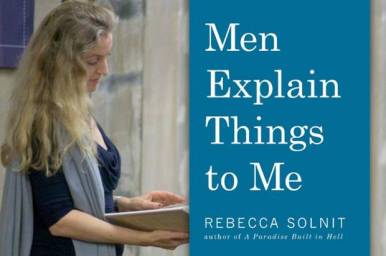
Problems with the reply: Again, the trouble starts as soon as Solnit opens her mouth. “Mansplainers” (translation: men who disagree with feminists or point out that they’re factually incorrect) are like fleas when we use social media. Solnit doesn’t just consider us misguided or wrong, she feels the need to compare us to parasites. Imagine her reaction if a man said the same type of thing about any woman who disagrees with a man or calls him out on an error. Crap like this is a good indication of why feminists need to stop celebrating their casual sexism.
Moving on, Solnit’s claim that men are mansplaining to women about women’s experiences is largely inaccurate. There will always be condescending people of both genders (as Solnit proves by being a living example) but the reason men typically jump in to refute something a feminist woman says is that her comments reveal unsupported and inaccurate animosity towards men. Feminists are unable to talk about men without throwing around terms like “toxic masculinity” and “rape culture.” They’re unable to admit that when they talk about the reasons men do certain things, or the views men hold, that they are often just theories. To men, our reasons and our views are not just theories. We actually know why we say and do things, and when a woman states that it’s because we’re universally-heterosexual perverted rapists being slowly poisoned by our masculinity, we have every right (and should be expected) to let it be known that we have issues with that bigoted and false assertion. Feminist women are no experts on men (and feminist men are often so ashamed of being men that they forget what masculinity even is, losing touch with it’s value completely.) Men are experts on ourselves. If a man tells a woman she is wrong about something she’s said about men, he’s more than likely right, and she is more than likely wrong. What’s really happening is that feminists are spewing illogical hatred of men all over the internet, which makes it almost certain that a man is going to speak up to dispute their nonsense. When that happens, the feminist claims that it’s “mansplaining” for a man to explain men to women. It’s intellectual gibberish, but that may be the point: to catch the man in question off guard with comments so densely hypocritical that it’s likely to boggle his mind and shut him up, at least for a while.
As for the rest of Solnit’s reply, apparently she doesn’t spend much time speaking to any women who aren’t feminists. Some women do, in fact, enjoy catcalls (assuming they don’t cross certain lines, which they often don’t.) I know that for a fact because I’ve met some of these women. Being catcalled is basically being told you’re attractive. Being told you’re attractive is a compliment. People like being complimented. This isn’t advanced psychology, but it is too advanced for most feminists. Solnit’s issue is that she clearly makes no distinction between catcalling and criminal behaviors like harassment, stalking and assault. At some point, she might want to address why she thinks that saying “Damn, baby, you look good!” to someone walking by, and then forgetting them as soon as they’re out of sight, is the same as following them home, attacking them, or otherwise refusing to take no for an answer. And sure, I’m aware that some women just don’t want to be hit on, even if it’s meant as a compliment, and that some “catcallers” use foul language. Know what? I don’t care. Cry me a river. Receiving compliments isn’t going to hurt them and neither is hearing some colorful language. They need to grow some thicker skin. Freedom of speech means that we all have to hear stuff we’d rather not, including comments to or about us. It might be a trade-off, but it’s one that protects civil rights. That’s something I do care about, and I won’t support feminists in trying to curtail freedom of speech just to protect the delicate baby feelings of those women who think they’re oppressed by the fact that men are allowed to talk to them. You know what you’re supposed to do when someone says something that you don’t like? You either tell them exactly how you feel about it or you walk away. Those are options that are available to you. Silencing others is not. In summary of my broader point, no one is saying, as Solnit claims, that women “like street harassment, but that doesn’t actually exist.” We’re saying some women enjoy being catcalled, at least sometimes, and that catcalling has to cross some pretty clear lines before it can accurately be called “harassment.” We’re also saying that men have the right to catcall within reason, whether women like it or not. Any person who doesn’t understand such simple facts is certainly not an “expert” on these issues, no matter what their credentials. The Isla Vista murders committed by Elliot Rodger come up again in Valenti’s next question, and will be addressed in my response.
VALENTI: Speaking of Isla Vista, in the wake of that tragedy there’s been a lot of talk about masculinity and toxic masculinity. The misogyny was so obvious – we have a mass murderer saying hatred for women is the reason for his attack – and yet some people still argue that these murders had nothing to do with sexism. What do you make of this?
Problems with the question: Valenti has put forth another false premise. Virtually no one is claiming Rodger’s killing spree had “nothing to do with sexism.” What so many are pointing out is that it wasn’t just about sexism. Rodger was clearly a misogynist, but he was also racist and mentally ill. He also hated any man who was more successful with women than he was (which is most men.) It would be much quicker to list the people that Rodger didn’t hate than to list everyone he had animus towards. To most of us, it’s important to address all the causes of a brutal killing spree, rather than focusing solely on one, to the detriment of other pressing cultural issues. To feminists such as Valenti ,though, gender is always more important than anything else, misogyny is always the only kind of prejudice worth combatting, and the female victims are always the only ones who were fully human, or should be mourned. Valenti doesn’t care about the men Rodger murdered, and she won’t stand for anyone else caring about them, either. The only thing that’s important to her is finding a way to co-opt the memories of murder victims to garner support for a movement that she has no earthly idea what they thought of. She’s not a psychologist or a criminologist, she’s just an opportunist using a bloodbath as free marketing. I don’t know how she sleeps at night, but it might have something to do with being a really shitty person. Now onto Solnit’s reply.
SOLNIT: There are a lot of ideologies out there passionately devoted to not connecting dots. There are climate denialists who think that 97% of all the scientists on earth are in conspiracy to spread lies and the weather is just fine; there are people who don’t want to know that American foreign policy makes us, to say the least, a little unpopular in some places; and there are people who find that thinking about misogyny and violence against women is uncomfortable and think that they have a God-given or Constitutional right to eternal comfortableness, as far as I can tell.
Right now I think that a lot of people get it and a lot of people are getting more engaged with the ideas, with the issues, and with the urgency of the situation. I feel like I’ve been waiting all my life for women to be talking the way we are right now, and that many men have joined in the conversation or support from the sidelines or get it is magnificent and inspiriting. (And then, yeah, those other guys. “Not all men”.)
Problems with the reply: Even when Solnit is right, she’s still wrong. There are ideologies out there devoted to not connecting dots, and chief among them is feminism. Comparing feminism to science as if they’re remotely the same is absolute rubbish. Unlike the 97% agreement among scientists about climate change, feminist theories do not enjoy anything approaching majority support from anyone, including women. Feminism is not based on scientific fact. In this analogy, feminists are not the 97% of scientists who care about getting things right, they’re the climate change deniers who care more about ideology than facts. As for the assertion that anyone who doesn’t robotically regurgitate feminist dogma about the Isla Vista killing spree thinks they have a right to “eternal comfortableness,” (comfortableness isn’t a word, by the way) does Solnit have no sense of irony? Feminists are clearly the ones who think they’re entitled to eternal comfort (to use the correct phrase) or else they wouldn’t treat catcalling or opposing views of feminism as misogynistic violations of their rights. Towards the end of this reply, Solnit claims she thinks it’s “magnificent and inspiring” that men are joining in on conversations about gender and sexism, which leads one to wonder why she’s so happy that the word “mansplaining” is there to shame the majority of us for doing exactly that. Of course, she just has to add a little dig in there about guys who say “not all men”, as though feminists don’t use their own, weaker version of that retort when they reflexively blurt out “that’s not feminism!” anytime a member of their ranks is caught redhanded in a fit of undeniable bigotry. Time to deal with Valenti’s next flawed question.
VALENTI: Your essay “The Longest War” is about sexual assault and, this week, we just found out about yet another gang rape at a high school. What do you think it will take for our culture to take rape – and the notion that this is an epidemic of violence against women – seriously?
Problems with the question: You don’t have to be an extremist feminist idealogue to take rape seriously. We have laws against rape in the West. In fact, we take rape of women so seriously as a society that we’re more than willing to disregard the civil rights of college men accused of it. It’s only when women rape men that most people don’t take it seriously, despite the recent study (which I get tired of having to repeatedly reference) that found that this type of rape happens quite frequently. Of course, someone like Jessica Valenti would never consider it an “epidemic” for men to be abused on a regular basis, only to have many people mock or ignore us if we report it. Mocking the pain of men is one of Valenti’s favorite passtimes. If you have a penis or any masculine traits whatsoever, this woman is utterly incapable of feeling even a twinge of empathy for you, no matter what traumas you endure.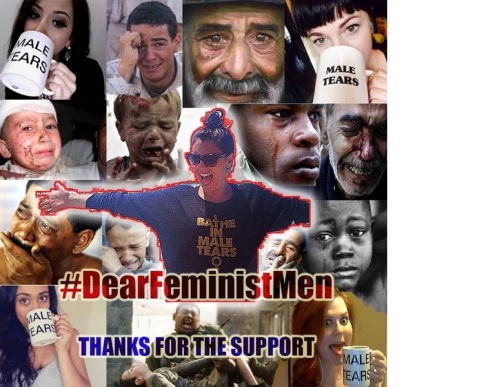 Unlike when it happens to men, tons of people offer support to women who are raped (provided they know about it.) Generally speaking, the only ones who don’t agree that raping a woman is a serious and devastating offense are the small number of people who are rapists, sociopaths, or both. While our justice system does need to be reformed so that we can prosecute more rape claims made by both genders while still protecting the rights of the accused, feminists have done almost nothing but distract from that necessity by trying to take these matters out of the hands of law enforcement whenever possible. If we can have universities handle the investigation when a college student is accused of rape, why shouldn’t we have high schools deal with it internally when a high school student is raped? Jessica Valenti should ask herself if she’d rather the poor girl she wrote about have the outcome of her case decided by experts or amateurs. If her answer is the former, she needs to start taking rape more seriously herself. By supporting the idea that rapes can be prosecuted by whoever happens to be around, Valenti and her feminist ilk are guilty of treating rape and justice like it’s all just one big joke. On to Solnit’s reply. Her answer is rather lengthy this time, so I’ll be interspersing my responses with the comments of hers that they pertain to.
Unlike when it happens to men, tons of people offer support to women who are raped (provided they know about it.) Generally speaking, the only ones who don’t agree that raping a woman is a serious and devastating offense are the small number of people who are rapists, sociopaths, or both. While our justice system does need to be reformed so that we can prosecute more rape claims made by both genders while still protecting the rights of the accused, feminists have done almost nothing but distract from that necessity by trying to take these matters out of the hands of law enforcement whenever possible. If we can have universities handle the investigation when a college student is accused of rape, why shouldn’t we have high schools deal with it internally when a high school student is raped? Jessica Valenti should ask herself if she’d rather the poor girl she wrote about have the outcome of her case decided by experts or amateurs. If her answer is the former, she needs to start taking rape more seriously herself. By supporting the idea that rapes can be prosecuted by whoever happens to be around, Valenti and her feminist ilk are guilty of treating rape and justice like it’s all just one big joke. On to Solnit’s reply. Her answer is rather lengthy this time, so I’ll be interspersing my responses with the comments of hers that they pertain to. SOLNIT: Part of what was shocking about the Steubenville sexual assault – one of the 2012 crimes that has opened up a new conversation about rape culture and sexual entitlement – is that the boys evidently thought that violating and humiliating a helpless human being made them cool. Where the hell did they get that idea from? And how do we take them out of that lad culture (in which it is indeed cool) and back to civilization where it’s horrible and you’d be despised and regarded as repulsive (by enough of us if, sadly, far from all of us)? I think the culture at large is getting – post-New-Delhi and Steubenville, and post a lot of great speaking and writing by feminists like you – the idea.
SOLNIT: Part of what was shocking about the Steubenville sexual assault – one of the 2012 crimes that has opened up a new conversation about rape culture and sexual entitlement – is that the boys evidently thought that violating and humiliating a helpless human being made them cool. Where the hell did they get that idea from? And how do we take them out of that lad culture (in which it is indeed cool) and back to civilization where it’s horrible and you’d be despised and regarded as repulsive (by enough of us if, sadly, far from all of us)? I think the culture at large is getting – post-New-Delhi and Steubenville, and post a lot of great speaking and writing by feminists like you – the idea.
Problems with the reply: These crimes did open up dialogue, which is the only thing that could possibly be considered any kind of silver lining. Unless you’re a feminist of Solnit’s stripe, of course, and then the real silver lining is that you get to exploit another victim for your cause. Just look how quickly she gets the old “rape culture” chestnut in there, and how she says that the culture is having a conversation “about rape culture” while leaving out that much of that conversation has concerned whether or not rape culture is even a real thing. In typical feminist fashion, she subtly presents a highly debatable, widely panned and woefully simplistic feminist theory as accepted fact. The only way she could exploit the situation even more would be to find a way to suggest that even most high school boys are already victims of their “toxic masculinity.” Oh, wait, that’s precisely what she does next. Solnit apparently realizes that she might take some flak if she talks about teenage boys in the same dehumanizing ways that she regularly talks about grown men, so she uses the phrase “lad culture” in place of “rape culture,” but it’s pretty clear what she’s really saying. According to her, it’s only teenage boys (lads, if you prefer) who ever violate or humiliate someone in any way. It has nothing to do with kids in general often being immature and cruel, their sense of self very much still in development, their ability to withstand peer pressure and speak up for what’s right varying greatly from one teenager to the next. It should all just be blamed on “lad culture” because, God knows, young girls would never dream of abusing or victimizing anyone. That sort of thing isn’t part of “lass culture.” Females are always more morally upstanding than males, whatever their age. Here’s where I feel called upon to ask “Ever heard of Lena Dunham?” It seems Ms. Dunham couldn’t even make it to the ripe old age of eight before becoming a sexual predator. She molested her little sister on a basis regular enough that, as the younger child aged, she apparently grew to accept this type of abuse as normal and healthy. Not that most people need the Dunham example to know that girls can be just as cruel, abusive and sex driven as boys (sometimes more.) Sadly, by the time they graduate high school, most people have encountered bullies, perverts, and other dangerous types from both genders. This part of Solnit’s comments ends with a quick polishing of Valenti’s hindquarters as Solnit goes out of her way to assure her that she is important, and not just a run of the mill misandrist fearmonger. Would these two just get a room already?
But how do we undermine the lad culture, that jeering, tittering, competing, struggling realm of young men left to themselves and to the worst notions of what it means to be a man, or undermine the segregation in our culture that leaves the young to socialize as though they were another species? I mean, in some small and rural places and other cultures, teenage is not a distinct ethnicity or caste or pariah group, and teenagers are not left largely to their own devices.
Oh, Jesus Christ. Now Solnit is more or less admitting that she wants to “undermine” all young boys because other boys their age have, on rare occasions, committed heinous crimes such as rape. It’s not enough to simply punish the guilty parties. No, it’s very important that feminists be allowed to meddle in the lives of all maturing teenage boys, in an attempt to guarantee that they don’t make it out of high school without learning to hate their penises. As for the rest of her comment, it’s all a little too vague to know for sure, but it sounds suspiciously like she’s saying that teenagers should be spending more time palling around with people considerably older than them who they’re not related to. But wait, what about this “rape culture” that adults are supposedly a part of? Isn’t she worried that if teens hang out with adults, all the adult men will teach all the teenage boys how to rape all the teenage girls, and that many of the adult women will simply shrug and say “Rape culture, ya know? Whaddaya gonna do?” It’s almost like Solnit forgot to believe in one of her favorite feminist theories for a second there.
Too, I think we need to make blatant misogyny widely regarded as gross and despicable and ignorant the way we have racism, and this time that we means men.
Mission accomplished. Solnit can quit playing the oppression game. Blatant misogyny (and even subtle misogyny) is already widely regarded in all the ways she wants it to be. The only reason she won’t acknowledge that is because it would deny her a chance to talk down to men, who she’d rather accuse of hating and oppressing women all the live long day. This is a clear example of the kind of comment that prompts men to reply, in an effort to inform women like Solnit that most of us don’t accept or engage in misogyny. Which would, of course, result in the standard accusations of mansplaining, because men aren’t allowed to correct women about what it’s like to be a man, or how men tend to feel.
And a lot of men are, as never before, stepping up. Only men can dissuade men from a misogyny that discounts a woman’s right to speak, let alone what she says. The sexual assault that just happened in Tennessee: this time the authorities are responding fairly appropriately and a local male columnist wrote a column about it– a tough, clear, no-excuses for assault analysis that any feminist could love.
Finally, I think feminism has made astonishing progress over the past 50 years, so I think both that it’s going to take a long time and we’re well on our way.
Aw, look, she compliments men almost immediately after insulting us! I guess that’s supposed to make it all okay. Look, it’s 2014. There are probably about a dozen men left in the entire West who truly believe that women don’t have the right to speak. There may be a few more than that who are less likely to greet women’s words with an open mind, or who still consider women to be weak and overly emotional, but even they are nothing resembling a majority. If Solnit wants men to advocate for feminists (feminists, not women) she could try giving us a little more credit. And another thing: if a man is a misogynist, or a homophobe, or a racist, or any other kind of bigot, there is actually precious little that I, or any other man, can do to talk him out of it. We can try, and often do, but it’s pretty difficult to police another human being’s thoughts. This is something I’ve learned in the process of having to deal with bigoted men and women ever since I came out of the closet. Some people harbor bigotry without even realizing it, and do everything in their power to extricate themselves from its grip once they know its there. Other people revel in their bigotry proudly and will probably never be reached, or feel compelled to evolve (many of these people eagerly embrace feminism and find it a perfect fit.)
For the record, the column Solnit refers to is indeed well-written and I didn’t notice anything in it that you’d need to be a feminist to agree with. However, let’s extend this “no excuses, no tolerance” policy to all offenders, and stop taking it so lightly when women sexually violate men and boys. That Solnit limits her concern to female victims and encourages men to do the same is morally indefensible. When she says that feminism has made “astonishing progress in the last 50 years,” am I the only one who wonders if she’s referring to the movement’s success in convincing a large number of sources in the media that giving a shit about men is misogyny? After all, feminism certainly hasn’t become more popular with the general public; most women either can’t be bothered with it or actively oppose it, and its obvious misandry is chasing a growing number of men into the open arms of egalitarian and Men’s Rights movements. Feminists know this, too, which goes a long way towards explaining their desperate attempts to force every remotely “hip” celebrity they can think of to declare themselves a feminist, in hopes that their teenybopper fans will mindlessly follow suit. Phew! That was a lot of bullshit to shovel out of my path. I’m glad I can finally move on to Valenti’s final question (she actually asks two more questions of Solnit, but the last one is so devoid of journalistic value that I don’t even feel the need to bother with it.)
VALENTI: What are your thoughts about online harassment – specifically the online harassment of outspoken women? I used to to think of just abandoning the Internet, but it’s as much a public space as the street these days… there’s no avoiding it and it’s my space too!
Problems with the question: Plenty. For one thing, Valenti has never shown any indication that she cares if women are harassed unless they happen to be feminists (which means she doesn’t care if it happens to most women.) Secondly, “harassment”, like “Post Traumatic Stress Disorder,” is one of those terms that means something vastly different to feminists than it means to everyone else. It usually just means someone disagreed with them, hurt their feelings, or made them doubt their own dopey rhetoric. Thirdly, “outspoken” is a word feminists use to describe one another when even they know better than to use more desirable terminology like “smart”, “insightful”, or “accurate.” What Valenti is really asking is “What are your thoughts on how to make harassment charges stick when someone keeps telling a feminist woman that she’s wrong, but hasn’t done anything illegal?”
If you can’t stand disagreement or people saying mean things, many places on the internet are probably not “your space.” Those spaces are for adults who can still function after having a conflict with a person they will likely never officially meet, and you should stick to Nickolodeon message boards or Youtube videos about the best places to throw your 5th birthday party. You’re free to ignore my advice and surf on over to the adult parts of the net anyway, but you should keep a few things in mind. Adult conversation often gets heated and passionate. No one is required to alter the perfectly legal ways it’s comfortable for them to talk or behave just to appease you. If you think otherwise, you think don’t think the internet is “your space, too,” you think it’s your space, period.
If someone threatens your life or livelihood in a manner which you believe to be criminal, go to the police. Don’t scream it all over social media to people who have no idea what to do about it, or worse; who think they know what to do about it and start doxxing everyone you’ve ever crossed paths with online. And unless the threats against you are entirely legit and you’re in imminent danger of harm from a real assailant who has done more than just say mean things to you or try to scare you online, do not compare your “harassment” to the massacre committed by Elliot Rodger, as feminists have been encouraging women to do. That’s in really bad taste. You weren’t a victim in that tragedy. It’s not about you.
I predict that shortly after I post this, some feminist will come along to tell me that I’ve been insensitive to women that have been harassed online and/or that I can’t know what that’s like, because men aren’t harassed online because of our gender. I’m not going to ignore the advice I gave in the paragraph above by going into all the specifics online, but as a disclaimer: You can’t be a man who vocally disagrees with feminism online without being harassed because of your gender. As an example, a feminist once got so enraged at me for arguing against his talking points while being male that he claimed to have figured out where I lived based on a picture I’d posted, and that he was coming to eat my dog (an adorable little pomeranion named Oz who I also post pictures of sometimes, and who is basically my sun, moon and stars.) That’s all I’m telling of that story, except for the assurance that no creep ever showed up to eat my dog. And that I’m pretty sure this means Oz is now entitled to Tweet his harrowing tale under #YesAllWomen. Alright, enough about me and my dog being harassed by a feminist on social media because we’re guys, here’s Rebecca Solnit to 100% agree with Jessica Valenti that harassment online is exclusively a women’s issue.
 SOLNIT: There are a lot of ways the Internet needs to be democratized and made into a public commons: when it comes to protecting our privacy and not monetizing our data for advertisers or sharing it with the NSA; and not letting advertising drive what everyone does and sees and makes; as well as not letting haters try to scare women into silence or make their lives miserable. The whole raison d’être needs to be reinvented, and I’d be all for not nationalizing but some form ofinternationalizing (or regulating for the public good) some of the more universally used sites (Siva Vaidhyanathan has a very good book about doing that with Google’s ubiquitous search engine).
SOLNIT: There are a lot of ways the Internet needs to be democratized and made into a public commons: when it comes to protecting our privacy and not monetizing our data for advertisers or sharing it with the NSA; and not letting advertising drive what everyone does and sees and makes; as well as not letting haters try to scare women into silence or make their lives miserable. The whole raison d’être needs to be reinvented, and I’d be all for not nationalizing but some form ofinternationalizing (or regulating for the public good) some of the more universally used sites (Siva Vaidhyanathan has a very good book about doing that with Google’s ubiquitous search engine).
My friend Astra Taylor points out in her new book, The People’s Platform, “Those posting with female usernames, researchers were shocked to discover, received 25 times as many malicious messages as those whose designations were masculine or ambiguous.” Way too many sites tolerate, maybe even feed, really vile forms of misogyny – from Twitter to a lot of supposedly progressive news sites – because it’s all about getting the clicks or traffic that convince advertisers to give them money. Hate is profitable. And human beings are chameleons; I think that some of these sites, groups, spaces, threads, don’t just give misogyny an outlet; they breed and feed and cultivate misogyny.
Two things, though: men intent on silencing women like you truly believe that you are a threat. They believe your voice matters, that you’re part of changing the world, and they don’t want it changed that way. So there’s a weird kind of validation in it, but one I’m sure you and Mary Beard and the rest of the women under attack could live without.
The other thing is: these haters seem to be pretty irony-deficient. Helen Lewiscreated Lewis’s Law on Twitter in 2012: “Comments on any article about feminism justify feminism.” You go to #YesAllWomen on Twitter and see so many guys now showing up to mock, sneer, harass, and threaten, to just try to piss on the party, and you realize they have no idea they’re demonstrating why we need feminism. We need it because some men hate women; want to violate and silence and annihilate us; can’t stand us telling our truths; don’t think we have any rights; think they’re more important and sole holders of the truth. And they are those men. It’s a parade of excellent specimens. Unfortunately.
Problems with the reply: That was another really long answer in which Solnit implies what she’s really advocating for while seeming reluctant to explicitly spell it out. The NSA stuff is a distraction that has nothing to do with the question, and when she talks about “not letting ‘haters’ try to scare women” she doesn’t go into what someone would have to do to be officially classed as a “hater.” Is this a gender neutral term, or will only men be branded “haters?” She also doesn’t specify what measures, exactly, would be taken to “not let” people make comments online which women might find offensive. By the time she talks about “regulating” the internet for the “public good”, it’s tough not to think she’s talking about controlling as many online forums as possible for the good of feminism. Had Solnit showed any evidence of wanting to protect any victims of harassment who aren’t women, I might be more willing to give the benefit of the doubt. Since I don’t make any money from blogging and have to actually work, I don’t have the luxury of reading enough of the two books Solnit linked to before posting this that I’d feel comfortable addressing them in depth right now. From the skimming I did, there are parts that do seem to advance arguments similar to Solnit’s in a less Orwellian-sounding manner. However, Valenti’s interview is with Solnit, not these authors, so I’m not sure how much that matters. It doesn’t abdicate Solnit of responsibility for talking about harassment online solely as “haters scaring women” or for making her point clear even to people who don’t have time to read two books just to figure out how she would go about “regulating” the internet to abolish harassment of women. Considering the length of her comments here and that she mysteriously brought the NSA into it, there’s no excuse for a simple presentation of what actual steps she wants to see taken not being in the interview. For one thing, it would be nice if Solnit had told us who the “researchers” that allegedly discovered that female usernames elicit 25 more times the harassment were affiliated with, other than her “friend” Astra Taylor. I guess I’ll have to keep hunting to find out who they are, what study or project they were with, what their methodology was and what types of behaviors towards female usernames did or did not qualify as “harassment.” I’ll also have to figure out why it is that Solnit thinks click-based websites only tend to promote misogyny, without promoting misandry, racism, homophobia, or any other bigotries that she never talks about. Everybody has the time for that kind of research, right? Well, if you don’t, Solnit is probably perfectly okay with you being overwhelmed by all the unanswered questions and assuming she’s right about everything. As the caption on her interview picture says: “Rebecca Solnit is smarter than you.” Yet she thinks “comfortableness” is a word and that Jessica Valenti is “changing the world” by nagging Taylor Swift into saying she’s a feminist on TV. Oh, and she used the word “party” to describe a hashtag feminists ostensibly created to tell somber stories of sexism in the aftermath of a bloody killing spree.
According to Solnit, people who don’t like Valenti think she’s a threat. That’s partly true, partly false. The idiotic misandry of Jessica Valenti in and of itself is a rather minor threat to the civil rights of men. The fact that she’s just one mouthpiece in a sea of prominent feminist bigots is the greater concern. This latest brownnosing of Valenti is left more vague than the others. Solnit doesn’t say how she believes Valenti is changing the world. She says the “haters” of women like Valenti don’t want the world to change in those ways without making a case for why they should want it to. Since Solnit gives no assurance whatsoever that the change she desires is intended for the greater good of humankind, we can’t know whether or not men are justified in feeling threatened.
 One of the few specifics we heard about Solnit’s views in this interview is that she thinks any comment in reply to anything a feminist says justifies feminism, which sounds suspiciously like the kind of circular logic often employed by organized religion. I still want to know what her faith calls upon her to do to the internet. I’d like to know what she wants to do to keep teenage boys from taking part in “lad culture,” or who these adults are she wants teenagers to spend more time with. I’d like to know how she can act like feminists don’t give as good as they get when it comes to harassment in an online environment where feminists make up new terms because they “need” language to shame men with, and threaten to eat men’s dogs as a means of intimidating us out of “mansplaining.” Rebecca Solnit used a lot of words to say very little, never once talking about men as autonomous beings whose lives have meaning outside of our interactions with women. Instead of prodding Solnit for a thorough articulation of even one or two salient points, Jessica Valenti was happy to let the proceedings devolve into a feminist love-in where she and the subject of her interview could affirm for each other how right they both are about everything. Which makes them both doddering idiots.
One of the few specifics we heard about Solnit’s views in this interview is that she thinks any comment in reply to anything a feminist says justifies feminism, which sounds suspiciously like the kind of circular logic often employed by organized religion. I still want to know what her faith calls upon her to do to the internet. I’d like to know what she wants to do to keep teenage boys from taking part in “lad culture,” or who these adults are she wants teenagers to spend more time with. I’d like to know how she can act like feminists don’t give as good as they get when it comes to harassment in an online environment where feminists make up new terms because they “need” language to shame men with, and threaten to eat men’s dogs as a means of intimidating us out of “mansplaining.” Rebecca Solnit used a lot of words to say very little, never once talking about men as autonomous beings whose lives have meaning outside of our interactions with women. Instead of prodding Solnit for a thorough articulation of even one or two salient points, Jessica Valenti was happy to let the proceedings devolve into a feminist love-in where she and the subject of her interview could affirm for each other how right they both are about everything. Which makes them both doddering idiots.
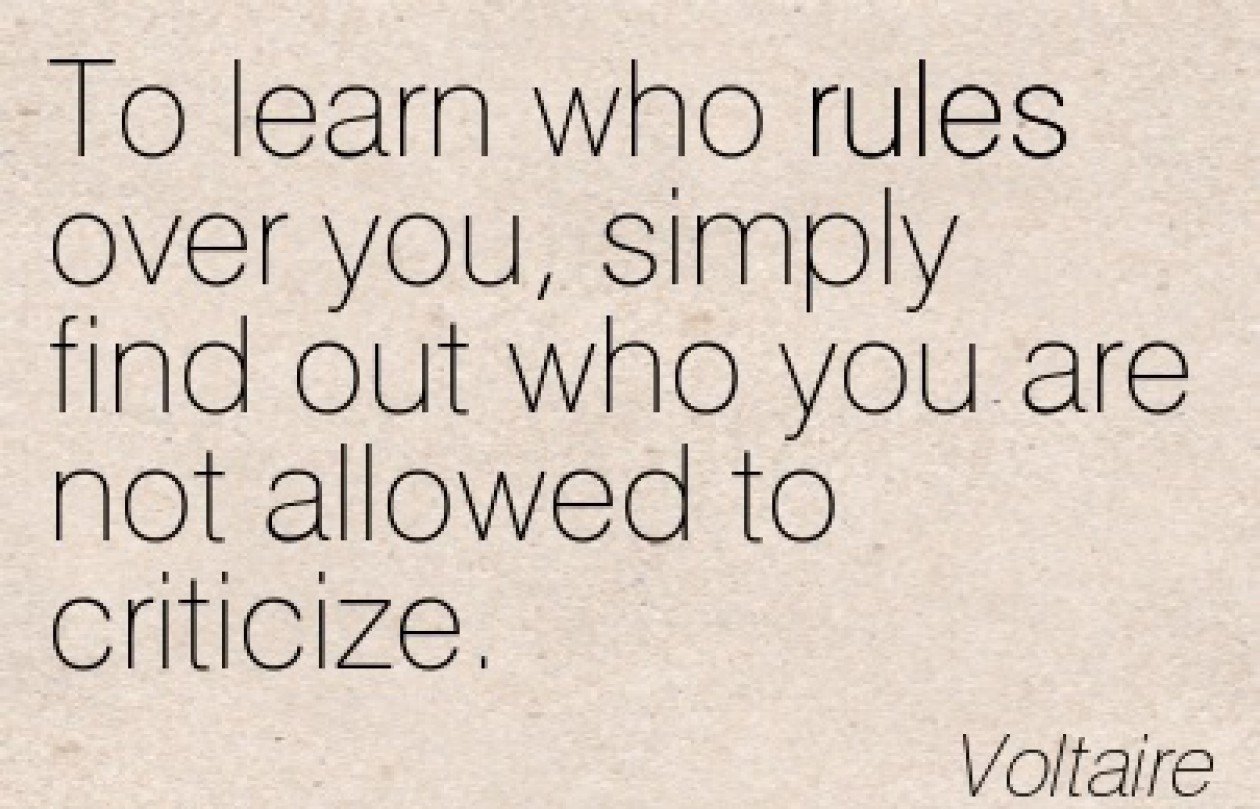

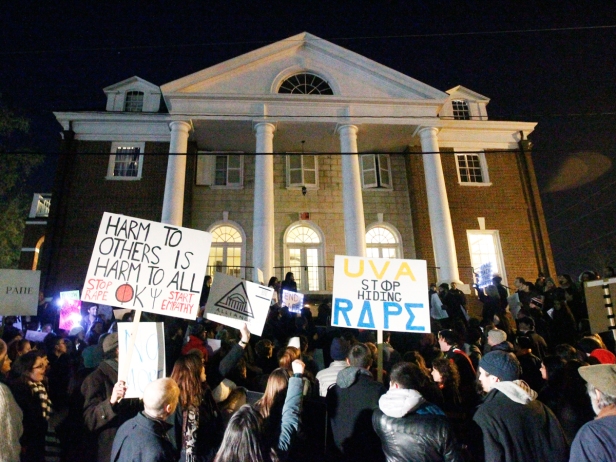
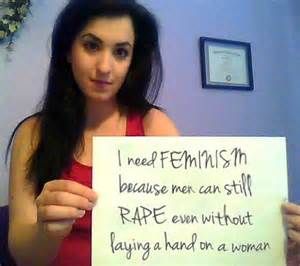
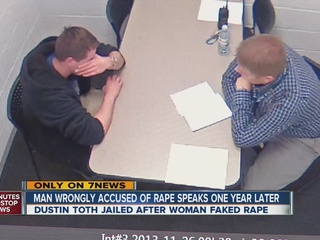

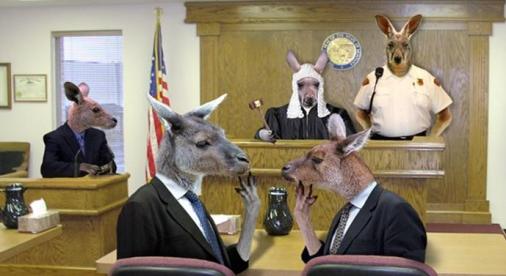
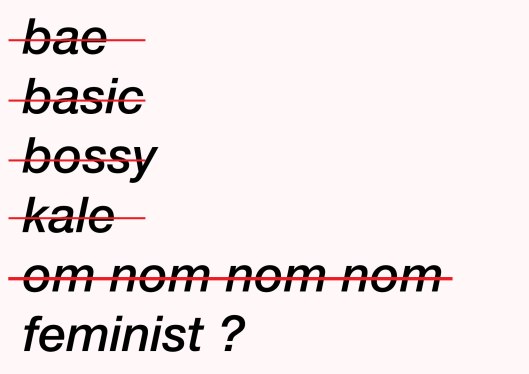

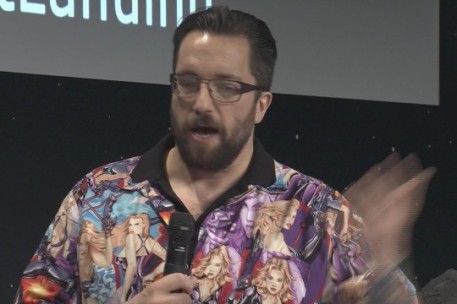 Let’s deal with the silliest stuff first, and talk about that shirt. Dr. Matt Taylor, known by those he works with for wearing bright, unconventional attire, decided to wear a shirt made for him by his friend Elly Prizeman the day he successfully landed a probe on a comet. The shirt was a birthday present, and features comic book-esque renderings of women who feminists are referring to as “scantily clad”, though that term applies more to some of the figures depicted than others. Dr. Taylor manuevered the Philae into the correct position despite the probe having sustained damage to a thruster, but that was basically just an afterthought, as the media disregarded his accomplishment and focused almost entirely on how he was dressed. As Glenn Harland Reynolds noted in a recent column for
Let’s deal with the silliest stuff first, and talk about that shirt. Dr. Matt Taylor, known by those he works with for wearing bright, unconventional attire, decided to wear a shirt made for him by his friend Elly Prizeman the day he successfully landed a probe on a comet. The shirt was a birthday present, and features comic book-esque renderings of women who feminists are referring to as “scantily clad”, though that term applies more to some of the figures depicted than others. Dr. Taylor manuevered the Philae into the correct position despite the probe having sustained damage to a thruster, but that was basically just an afterthought, as the media disregarded his accomplishment and focused almost entirely on how he was dressed. As Glenn Harland Reynolds noted in a recent column for 
